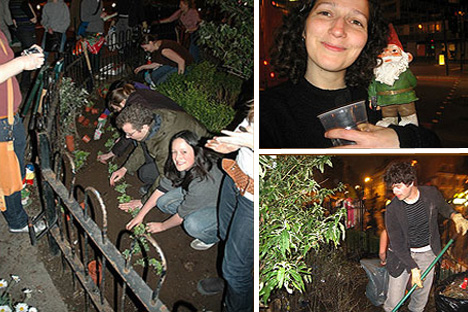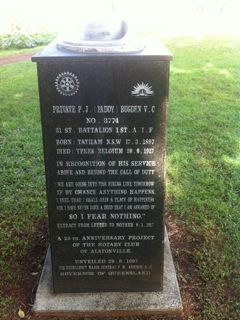Paddy Bugden is Alstonville’s favourite hero. And why wouldn’t he be – handsome, brave, a fine footballer, a war hero – and his dad owned the only pub in town!
After WW1 started, as soon as he was old enough to successfully lie about his age, Paddy left the comforts of ‘The Federal Hotel’ and travelled to Brisbane to enlist in the Australian Infantry Forces.
Sent to France, he developed a reputation as a fierce fighter – yet still wrote every day to his family back home.
He was always on the lookout for news from the Northern Rivers.
“I have not received any papers either. Yesterday I was walking past a tent in our company and I happened to look in the waste paper tin and found three Alstonville and half a dozen Lismore papers and I swair they were mine for there is no Alstonville boys in this company.”
“We are going into the worst fight of the lot but I am well prepared for it and have been well prepared ever since I landed in England,” he wrote to his mother on the eve of battle.
“Going to my duty every week and if by chance anything happens to me, rest ashored that I feel in my heart that I shall gain a place of happiness for I have never did a deed in my life that I am ashamed of. So I fear nothing.”
Not many of us can say that.
Later he wrote:
“I am back from the trenches for a short time. It wasn’t so bad. The worst thing is the stink for the trenches that we were in is surrounded by dead bodies.
A stiff fight taking place there about a month ago so the smell is just nice. It is impossible to burry all of them for Fritz is too lively in that sector.”
“I have a great name amongst the Batt boys as a footballer. They call me the ‘tank’ and they think there is no one like me as a player.”
“I had a funny game of football yesterday. Two of the players got wounded and were carried to hospital. Just as we started one chap happened to kick a bomb which exploded giving the two I mentioned some nasty wounds. We won the game. I was a picture by the time we had finished.”
It wasn’t until after he died that his family learned how brave he had been. A letter from a fellow soldier he had rescued gave a good example of his toughness. Corporal Alf Thomson wrote to Paddy’s family on 29 October 1917.
“I had a very thrilling and unique experience in the big stunt which I am now going to relate to you,” he wrote. “After we had advanced and gained our objectives, our boys on the right flank got the order to fall back owing to the English Division that was on our right not being able to come up.
“I was out in a shell hole in front and did not get the order to retire so I did not know that I was left out on my own. When ‘Fritz’ counter attacked us I got two of them with my rifle but I had to duck down into the shell hole owing to a machine gun firing on me.
“Just then three ‘Fritzes’ tum
bled into the shell hole on top of me giving me no chance to put up a scrap. They immediately disarmed me and the youngest ‘Fritz’, who was about 18 years of age, put his revolver at my head and was going to shoot.
“The eldest ‘Fritz’ of the three started gibbering away in German and eventually made the young ‘Fritz’ take his revolver away from my head (much to my relief!). A moment or so after the above occurred the ‘Fritz’ who had just saved me from being shot, made a jump into the next shell hole and got shot through the stomach.
“I looked up to see a private named Paddy Bugden charging up with a few men to my rescue. The other two ‘Fritzes’ made to get away but Bugden quickly finished them off and I was then able to get back to our lines safely.
“The whole of the above episode took place under very heavy shell, rifle and machine gun fire, so you can understand the debt I owe to Paddy Bugden for his bravery in rescuing me.
“I am exceedingly sorry to say that Bugden got killed by a shell a couple of nights later. I am glad to say that the authorities are recognising the heroism of poor old Bugden as he did some magnificent work beside what I have related. He is, I believe, getting the VC which he richly deserved.”
Indeed, Paddy Budgen was awarded the VC.
The citation reads
“For most conspicuous bravery and devotion to duty when on two occasions our advance was temporarily held up by strongly defended ‘pill boxes’, Private Bugden, in the face of devastating fire from machine guns, gallantly led small parties to attack these strong points and, successfully silencing the machine guns with bombs, captured the garrison at the point of a bayonet.
“On another occasion when a corporal, who had been detached from his company, had been captured and was being taken to the rear of the enemy, Private Bugden, single-handed, rushed to the rescue of his comrade, shot one enemy and bayoneted the remaining two, thus releasing the corporal.
“On five occasions he rescued wounded men under intense shell and machine gun fire, showing utter contempt and disregard for danger. Always foremost in volunteering for any dangerous mission, it was during the execution of one of these missions that this gallant soldier was killed.”
His VC forms part of ‘The Courage of Ordinary Men’, a special display in the Queensland Museum–
.
The Anzac Day march in Alstonville starts from Budgen Avenue, next to the Paddy Budgen memorial. Rather bizarrely, the statue of Bugden saving his mates is automatically sprayed peridoically by a jet of water, which both emulates the heavy German machine gun fire, and more practically cleans off the guano from the nearby flying fox colony.
Most appropriately, the day finishes with a game of Two Up and a beer or three in the Federal Hotel. A large photo of Paddy keeps an eye over proceedings on behalf of his father’s successors.
Reference : Australians at War
What I Learnt On 25th April in other years
Add a comment






















 RSS - Posts
RSS - Posts

